This is a subject of considerable interest to me, since I am 81 years old and getting older. Fast.
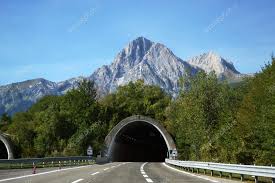
The End
All traditional Christians agree here. “All the peoples of the earth will …see the Son of Man coming on the clouds of heaven, with power and great glory.” Matthew 24:30 Then will be the Resurrection of the Dead, “those who have done good, to the resurrection of life, and those who have done evil, to the resurrection of condemnation.” John 5:29 This will be conjoined with 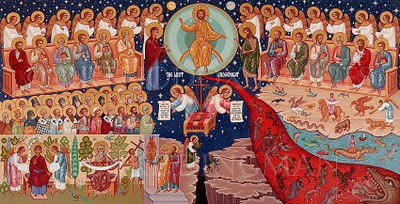 the Last Judgment. However, note carefully: “He who hears My word and believes in Him who sent Me has Everlasting Life, and shall not come into judgment, but has passed from death into life.” John 5:24 The Judgment will be of the “nations”, nonbelievers, those not consciously in union with Christ. Among them, those who have cared for “the least of my brethren” will enter “the Kingdom prepared for you”. Those who had no love will “depart into the eternal fire prepared for the devil and his angels”. Matthew 25:31-46
the Last Judgment. However, note carefully: “He who hears My word and believes in Him who sent Me has Everlasting Life, and shall not come into judgment, but has passed from death into life.” John 5:24 The Judgment will be of the “nations”, nonbelievers, those not consciously in union with Christ. Among them, those who have cared for “the least of my brethren” will enter “the Kingdom prepared for you”. Those who had no love will “depart into the eternal fire prepared for the devil and his angels”. Matthew 25:31-46
Can non-Christians be saved? Can those who did not believe in Jesus Christ be saved? Yes and No. No, because Jesus Christ is God, and God is salvation. But yes, because at that time they will see Him for who He is, and have the chance to accept Him or not. Some of the saints Gregory of Nyssa for one, have hoped that all might be saved. How could anyone see our loving Lord and reject Him? I don’t see how, but I wouldn’t bet on it. Some people already in this life seem impervious to Reality, so why shouldn’t they be the same then?
And those who are saved (and may you and I be among them) “will be like Him; for we shall see Him as He is.” 1 John 3:2 Oh, just to imagine – that we should see His beautiful glorious Face! and to be like our resurrected Lord!
But what happens before that? What about immediately after death? That is our chief topic today. I wonder a lot about it. Don’t you? How could we not?
New Testament Teaching
Christ said little about the immediate Afterlife, and even that is…is it irreverent to call it “vague”?
In the parable of Lazarus and the Rich Man Luke 16:19-31, it’s clear that both are alive immediately after death, but is the chasm between the Rich Man and Lazarus permanent or temporary? Is 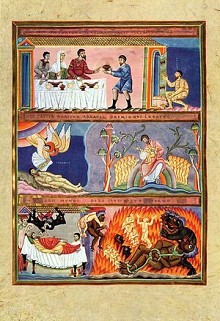 the Rich Man suffering in the fire of eternal punishment or in the fire of purification? Is the fire actual or is it symbolic? It’s not clear.
the Rich Man suffering in the fire of eternal punishment or in the fire of purification? Is the fire actual or is it symbolic? It’s not clear.
Jesus said “Settle matters quickly with your adversary (Σατανᾶς, Satan) who is taking you to court. Do it while you are still together on the way, lest your adversary hand you over to the judge, and the judge hand you over to the officer, and you be thrown into prison. Truly I tell you, you will not get out until you have paid the last penny.” Matthew 5:25-26 This is the origin of the Roman Catholic doctrine of Purgatory. But does Christ mean we can still repent and escape from going to “prison” after death? It’s not clear.
of Purgatory. But does Christ mean we can still repent and escape from going to “prison” after death? It’s not clear.
Christ said “in my Father’s House are many rooms. If it were not so, I would have told you.” John 14:2 “I go to prepare a place for you.” This fits with Saint Paul’s vision, where he was taken up to the “Third Heaven” 2 Corinthians 12:2-4 – presumably out of the Seven found in many ancient religions. Does this suggest that after death we may climb, room by room, toward the Highest One? It’s not clear.
Why did Jesus tell us so little about the immediate Afterlife? He didn’t tell us why! Perhaps because it is so beyond our ken that it cannot be put into words? Paul said that in the Third Heaven were things which “cannot be told, which man may not utter”.
Unlike Roman Catholics and many Protestants, we Orthodox have no formal, official teaching about the immediate Afterlife. About this and many other matters, we Orthodox agree not to speculate overmuch about the mystery.
I think it will help if we begin with non-Orthodox Christian beliefs, with a few comments from our Orthodox point of view. There are also many non-Christian beliefs about the Afterlife, but that’s too much to tackle here. It would make another interesting article (or two? or three?), now that I think about it.
Roman Catholic Teaching
Roman Catholics know precisely what happens in the immediate Afterlife.
They believe in Purgatory, where after death peoples’ sins “are purged away through torment or ‘purifying’ punishments’”. Catechism of Pope Paul VI, 1967. (No wonder my sweet, loving, faithful Grandma Rosie was afraid to die.)
For many centuries this terrifying hymn Dies Irae Dies Illae (“Day of Wrath, O Day of Mourning”) was part of the Roman funeral service. I think there is nothing hopeful in it. It’s all death and destruction. It is not sung much now, but interestingly I read that the first four notes often are heard in popular horror movies!
Roman Catholics believe that at death God decides where we will go, either Heaven or Hell. After that begins the fiery punishment of those who will go to Hell, which increases and continues forever. Those who will go to Heaven also enter Purgatory, but for them fiery purification begins in preparation for entrance into Heaven. How does God decide this? I’m not sure. For many centuries Purgatory was assumed to be a literal place, and the purification in literal fire. This was required to satisfy the “justice” of God, even of those sins He had already forgiven. (I’ve tried to understand this. I can’t.)
However, in a completely different tone, here is the traditional hymn as the body is led out of the church. “May the Angels lead you into paradise: may the martyrs receive you at your coming, and lead you into the holy city, Jerusalem. May the choir of Angels receive you, and with Lazarus, who once was poor, may you have everlasting rest.”
This is classic Gregorian chant:
This is the Faure setting. Every time I hear it, it almost makes me want to turn Catholic and die right now, so it can be sung over me. Almost.
The current Catechism of the Catholic Church (Sections 1030 and 1031) is not so fearsome about Purgatory: “All who die in God’s grace and friendship, but still imperfectly purified… after death [must] undergo purification, so as to achieve the holiness necessary to enter the joy of heaven… Certain offenses can be forgiven in this age, but certain others in the age to come.”
However, at recent Roman Catholic funerals I have attended, the horror of death seems to be nearly ignored. All is hope and joy, almost as if nobody had died. Is this typical now? I don’t know.
From the Orthodox point of view, I find it hard to put all this together. In our funeral service we sing about the dreadfulness of death itself, but all in the context of hope in the love and mercy of God. We’ll come to this next week,
I should add that in the midst of all this Roman Catholics still believe in Indulgences: prayers or acts of charity, each assigned a certain number of days (outside earthly time…?!) which can be applied to souls in Purgatory. When I read the Documents of the Second Vatican Council I thought much was acceptable, but then every so often here came lists of Indulgences, and I thought “What…?!” Orthodox find this just bizarre – to think that such things can be determined by Papal authority instead of being left to the love and mercy of God. Way down deep, the notion of Indulgences seems to be grounded in the correct belief (but twisted terribly out of shape by Western legalism) that before we can enter Heaven we need to be rid of our sins, and it helps to pray for others.
However we Orthodox are not quite faultless in this regard, as we shall see next week.
Protestant Teachings
“Teachings” because, as with all things Protestant, there are many. What follows here is a great oversimplification.
Reformation Protestants believed that we are saved by “faith 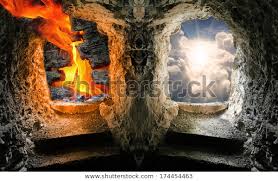 alone” (defined variously, and Calvin said it is pre-determined before our birth!) and that when we die we go to Heaven or Hell, and that’s it. Or alternately we sleep till the End of the Age. Protestants therefore think there’s no point in praying for the dead – although most Anglicans now allow such prayers.
alone” (defined variously, and Calvin said it is pre-determined before our birth!) and that when we die we go to Heaven or Hell, and that’s it. Or alternately we sleep till the End of the Age. Protestants therefore think there’s no point in praying for the dead – although most Anglicans now allow such prayers.
This betrays a completely different understanding of Heaven than ours. Heaven as we see it is not the reward for proper faith or good behavior. Heaven comes as the result of our growing into the perfection to which God calls us. We agree with Roman Catholics that after death we must continue to grow into the fullness of Salvation.
At our local coffee house, I’ve lately been having a friendly conversation with a woman from the Wisconsin Synod, the most rigid and conservative of Lutherans. They’re not even allowed to pray with anyone else, not even with other Lutherans. (She, by the way, has completely overturned my image of Wisconsin Synod people. I’ve had to deal with a couple of very conservative Lutheran pastors, and… … well, I expected her to be difficult and rigid and closed-minded. Far from it, she is simply faithful as she sees it, but pleasant and interested in knowing about the rest of us. So I live and learn!) She says it troubles her greatly to know that some of her friends and family, not being strict believers, will go to Hell. And she cannot understand why we Orthodox pray for the departed. “What good can it do?” I’ve explained that I pray for my departed loved ones because we believe “all are alive to God” Luke 20:38, and because I love them and trust Jesus to take it from there. When my father died in 1965 I was so thankfuI I had become Episcopalian, because if I couldn’t have kept praying for him it would have torn my heart out.
But now hear this! The best-selling 20th century writer among Protestants was 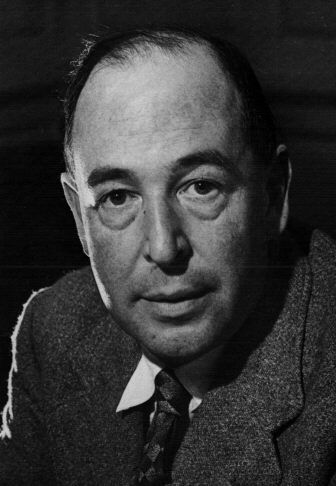 Anglican C.S. Lewis who received Communion at least weekly, made his Confession regularly – and said he believed in Purgatory! (Go figure.) He wrote “Our souls demand Purgatory, don’t they? Would it not break the heart if God said to us, ‘It is true, my son, that your breath smells and your rags drip with mud and slime, but we are charitable here and no one will upbraid you with these things, nor draw away from you. Enter into joy’? Should we not reply, ‘With submission, sir, and if there is no objection, I’d rather be cleansed first.’ ‘It may hurt, you know’—’Even so, sir.’” from Letters to Malcolm
Anglican C.S. Lewis who received Communion at least weekly, made his Confession regularly – and said he believed in Purgatory! (Go figure.) He wrote “Our souls demand Purgatory, don’t they? Would it not break the heart if God said to us, ‘It is true, my son, that your breath smells and your rags drip with mud and slime, but we are charitable here and no one will upbraid you with these things, nor draw away from you. Enter into joy’? Should we not reply, ‘With submission, sir, and if there is no objection, I’d rather be cleansed first.’ ‘It may hurt, you know’—’Even so, sir.’” from Letters to Malcolm
However in practice, many Protestants today seem to believe that at death everybody goes automatically to Heaven, a “better place”. Die and Bang! you’re in glory! Comforting, yes? and completely contrary to the Scriptures.
Next Week: Part Two – Orthodox Teaching about the Afterlife
Week after next: The Lenten Gospels – Who is Jesus?
I think a conversation with NT Wright would be very interesting as to what Anglicans believe – or should – on not only the afterlife, where we are physically resurrected with Christ in a renewed heavens & earth, but on how this current union with God should play out in our lives here & now, becoming part of God’s work as He renews the entire cosmos. He talks about this in ‘Surprised by Hope’, currently on my kindle.
N.T. Wright came to prominence since I left Anglicanism, so I’ve only heard of him. I fear that he reflects only one view “as to what Anglicans believe”, since different Anglicans believe quite different things. Or at least they did when I was there.
I think he is considered to be rocking the boat a bit by being an expert on early Christianity & pointing out where the current church has moved away from what they believed, & saying this is what all Christians should be believing.
I look forward to comparing what you have to say – I’m just curious about Orthodoxy currently as until the last few years I had no idea it existed, let alone what it believed, so am slowly reading here & other places to get the gist. I’ve read a huge amount of CS Lewis, & of course he has been described as an Orthodox outside of Orthodoxy. It may be that NT Wright is the same.
I am so looking forward to Next Week: Part Two – Orthodox Teaching about the Afterlife.
Just an “inquirer”.
Just pray that I get it right!
I am comforted by your teaching and including of the words of Christ in this forum. I call them , for me anyway, Father Bill’s cyber writs. Your attachments of aural and visual pertinence in these topics are useful. Thank you. To my point, in the case of earthly death, I personally find a sense of peace by offering my earthly pain from death of beloved ones, as well as understanding my own to come, by praying to Christ for His mercy and love. Indeed, as you reminded this reader, we are all alive in God. Certainly, I have involved myself with the prayer “indulgence” for my dead close ones in their continuing journey. Not so much for any period of time in accordance to Roman catechism, just for my own trembling heart of grief and thankfulness. I am forever grateful to have prayer and worship. It is a splendid life to enjoy & share this welcome rapport with Christ. I appreciate the sense of urgency I discern for myself at this time because of your thoughts. You point out that salvation is a continuing journey. That both frightens and fires me up. Still, I must better practice that now. I long for a taste of God’s grace, like a drop of water on my soul’s parched tongue, for both here on earth and for the ‘rooms’ to come. The King James Bible uses the word “mansions” in John 14:2. Cool. Knowing that our passed loved ones are possibly surrounded in heaven’s luxury of Love is a fabulous reassurance in healing from grief. Also, I know I have ‘rearranged’ a room to better suit my changing desires. Not sure about any stairs, but, I like to think that Saint Paul is offering insight that our heavenly rooms evolve along with our own soul’s progress.
Is the concept of Purgatory more recent? After the Schism or before, or as far back as the days of St Augustine.?
Good question. I’ve had to research it to be sure I knew what I was talking about. (Thank God for the internet!)
So far as I can find, the doctrine of Purgatory, as commonly understood today, was first formally defined at the Second Council of Lyon (1274), the Council of Florence (1438–1445), and later at the Council of Trent (1545–63). However, the Catholic Catechism says that since early Christians prayed for the dead we can assume it was for the purpose of their purification (purgation). They trace this back to prayer offerings for the dead in 2 Maccabees 12:42-44. However, that’s all a far cry from the later formal doctrines – Indulgences to gain time off Purgatory and so on.
Here’s my personal opinion: Roman Catholics seem so often to have taken a negative approach to prayer for the dead. Of course purification is necessary over there, but shouldn’t we pray chiefly for their growth in love and holiness and joy in the Kingdom?
Thanks again for your question.
Thanks, it has a mediaeval flavour !Pedantic .
You mentioned the Lutheran lady who was afraid that her friend will go to hell. Calvinist and Lutheran protestans do not teach that you automatically will be with Christ after you die, but they teach that everything depends on how you lived, and you cannot change anything after you died. It is important to pay attention to the 10 commandments, pray and follow the Lord as much as you can – in this life.
I am protestant, my husband is orthodox. Many at his church do not read the bible and don’t know the commandments. However they are nice people and I like his church.
I wish more Orthodox Christians knew the Holy Scriptures better – though some are quite versed in them. However the Scriptures don’t play quite the same role in Orthodoxy as they do in Protestant churches. I started looking seriously at Orthodoxy over 35 years ago, and I also found Orthodox people to be warm and welcoming – “nice people” indeed.
Fr Bill,
You say, “that before we can enter Heaven we need to be rid of our sins, and it helps to pray for others.” And again, “Heaven as we see it is not the reward for proper faith or good behavior. Heaven comes as the result of our growing into the perfection to which God calls us. We agree with Roman Catholics that after death we must continue to grow into the fullness of Salvation.”
Something I don’t get about Orthodoxy is the complete unacceptance, or lack of taking God at his word when he speaks of the New Covenant “I will remember your sins no more” (Heb 8:12). Or through the apostle Paul, “In Christ, God was reconciling the world to himself, not counting their trespasses against them” (2 Cor 5:19). Or, “Blessed are those whose lawless acts are forgiven and whose sins are covered. Blessed is the person the Lord will never charge with sin. (Rom 4:7-8). There are more, but space doesn’t permit. While it’s true (biblically speaking) that there is a required response to enter into the love of union and communion with Christ (We implore you on behalf of Christ, be reconciled to God-2 Cor 5:20), those who have entered into union with Christ (through a repentant heart in baptism – Rom 6) are in union now, in this life. In this union, are we not forgiven already? Or more appropriately, have we not entered into already the forgiveness that was already accomplished in Christ?
Orthodox Christians seem to hold that we’re not completely forgiven until we stop sinning or until we rid ourselves of all passions–nothing unclean can enter into the presence of God. That is, Orthodox look at the person’s condition and find room to doubt, to not take God at his word, to distrust, all because the (repentant) Christian is not in actuality rid of his sins. I find this completely non-sensical as it makes the word / concept of ‘forgiveness’ mean nothing. Forgiveness becomes a non-word. What need is there at all for forgiveness if we are ‘actually’ free from all sin? Consider Isaiah who said “Woe is me, for I am a man of unclean lips… for my eyes have seen the King, the LORD of hosts”. Then the seraphim came to him with the burning coal from the altar, touched his mouth and said, “Behold, this has touched your lips; and your iniquity is taken away and your sin is forgiven”. Is the death of Christ not the burning coal on our behalf? Has a repentant Christian not already been cleansed in the fire of the death of his repentance, his union with Christ in his own fire of death?
You also say, “However in practice, many Protestants today seem to believe that at death everybody goes automatically to Heaven, a “better place”. Die and Bang! you’re in glory! Comforting, yes? and completely contrary to the Scriptures.”
So what about Paul, who claimed on one hand “I have not attained” and then also said “to die is gain”, in the same letter even.
Excellent questions, Brian. I think we can take two approaches to this.
1) As I understand it (I’m no Greek scholar), the most common New Testament word for sin is “amartia” ἁμαρτία, which means “missing the mark”. Orthodox do not understand sin primarily as law breaking, though it may be that. The most common New Testament word for forgiveness (or at least the one we Orthodox run with) is aphiēmi ἀφίημι which can mean legal taking away the penalty of something, but also simply “sending something away”. Orthodox have traditionally understood forgiveness not as removing a legal penalty but as “sending away” our “being off the mark”. That is to say, we see forgiveness as “therapeutic” instead of “legal”, the Church not as a law court but as a hospital, and Christ more as the heavenly Physician, less as the Judge. The Christian life consists not of getting out of Hell, but as continual growth into the Image of Christ. Therefore (and here’s the point of all this) particular sins can be “sent away” but we’ll still be “off the mark”. Now, Western Christianity has usually taken the legal approach to all this, that when we repent God will take away the penalty of sin. Except that Roman Catholics traditionally have added that after death something about the sin, even if forgiven in this life, still needs to be “paid off” over there, and I don’t understand that at all. But does it “help” to pray for the departed? Yes. We can’t weigh out exactly what a prayer does over there – no more than we can over here. But Jesus commanded us to pray for each other, and “all are alive to Him”, so we do.
2) Or think of the Church as like a family and God as like a father – which was Christ’s chief image of Him, of course. The idea is for children to grow into maturity. Things done wrong because of their immaturity can be forgiven by their parents, but the children will still have a long way to grow.
Now, we Orthodox believe that Heaven is the final goal, long after we die. Or it can be said that, if God decides we’re worth “saving”, at death we enter into the outskirts of Heaven. (Read C.S. Lewis’ The Great Divorce.) Even if our earthly sins are forgiven (taken away), it will still be a long climb towards perfection, so that we’re ready for the full Glory of Heaven. Can we sin (choose to do wrong) after we die? I don’t know. I like to think that all choices will be good ones over there. But we will still be “off the mark” over there. As I say, at my advanced age I am sure that when I die in a few years I’ll be far from completely “on the mark”. So my getting on the mark over there is what the “intermediate state” or whatever we want to call it is all about.
And that’s why your final quotes from Paul seem contradictory from a classical Protestant point of view, but make complete sense from our point of view.
There. I’ve written more than I intended. Does it help? I don’t know. If not, let me know.
Father Bill
Fr Bill – Brian expresses well my own questions. Regarding your answer to him above where you said “at death we enter into the outskirts of Heaven……..Even if our earthly sins are forgiven (taken away), it will still be a long climb towards perfection, so that we’re ready for the full Glory of Heaven.”
There still remains the question about the good thief and Christ’s words “today you will be with me in paradise” . Is paradise not heaven? Is there some other interpretation of that word?
Another question regards your comment that the Nations in Matthew (the last judgement) means the non-Christian and that Christians will not be judged. I have heard this from one other Orthodox priest.
However, many Orthodox priests and scholars say that the Fathers have always interpreted this to mean that everyone faces the judgement. Also this is so much in our services, especially Lent. What about Sunday of the Last Judgement? If that is not for Orthodox Christians to worry about, then why does the Church mention it so much? Thank you.
Good questions. Thank you.
Regarding the good thief, here is a good commentary on Paradise and Hell: http://www.orthodoxytoday.org/articles-2009/Mettalinos-Paradise-And-Hell-According-To-Orthodox-Tradition.php
The point is that neither is a “place”, but rather a state of mind. To be in Paradise is to see Jesus Christ and love Him. After that we enter progressively further into Paradise as we stay with Him. Hell is to see Christ and hate Him, and that also will continue forever. The two thieves symbolize this.
Regarding Judgment, I’ve been trying to think this through and have discussed it with several other people, and sometimes I’ve felt I was right at the edge of figuring it out and then it slipped away again. So my answer is: I don’t know! Can someone help us answer this?
Another question. When is the New Heaven and New Earth?
After the Lord comes with clouds descending
when we are all raised incorruptible will this be in new Time and not a continuation of Time as we know it now,one thing after another? If it is a New Time series do people find themselves there inthe New Earth as they die now rather than in Eternity until the New Earth is founded and then put on it with those alive in the Last Day?
Forgive me. I’ve been so busy lately I forgot to try to answer your questions. However you ask things of which I know not. I can’t imagine our existing without some sort of time, but maybe God has a way. I’ve always taken it for granted that the time of our resurrection will be the Last Day of this Age and the creation of the “new heaven and a new earth”. But now that I thint, I’m not sure about that either. And the farther I get into this… … I’m going to stop. I wish I could tell you where to go for answers, but I don’t even know that. Do we have a Biblical scholar or a theologian here to help? I do appreciate your misplaced confidence in my knowledge!